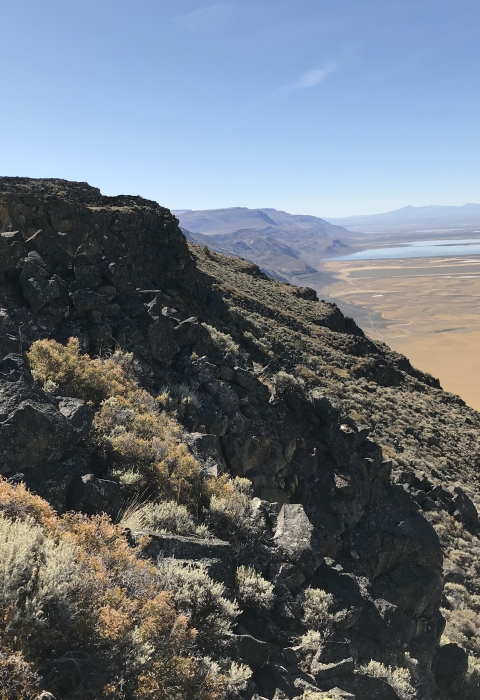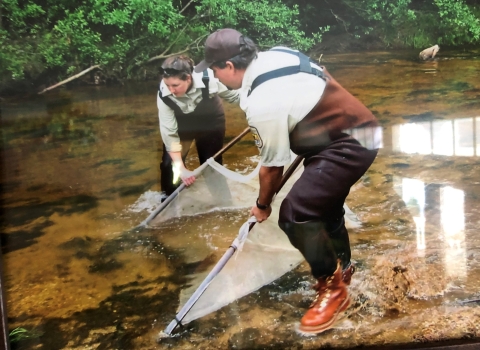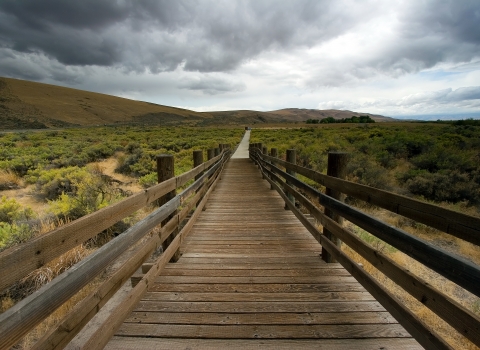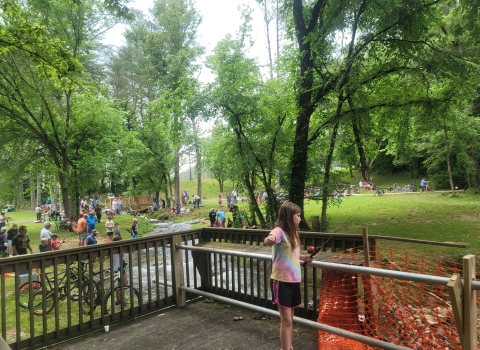Hart Mountain National Antelope Refuge in southeast Oregon was established in 1939 to protect pronghorn antelope and other high desert dependent wildlife. Last fall at the refuge, 11 volunteers from the Wild Sheep Foundation repaired vital water infrastructure that was damaged in a wildfire. In the arid, high mountain desert, a reliable source of water is essential for pronghorn antelope, California big horn sheep, and other species that depend on the refuge.
Conservation managers throughout the West use water guzzlers to ensure wildlife have dependable sources of water throughout the year. This is especially important in places where naturally occurring water resources have been degraded or damaged.
The iconic California big horn sheep were extirpated from Oregon, including Hart Mountain, in the late 1880s. Concerted conservation efforts, including the use of guzzlers, have brought them back to the state and the refuge in. However, biologists conducting aerial surveys counted only 48 sheep in 2020 – a 70% population decline since 2017.
In 2019, the Poker Fire swept over portions of the refuge, burning thousands of acres. During the fire, an important water guzzler was damaged. The guzzler required over 200 feet of pipe and a new apron that gathers rainwater and snow and funnels it into a holding tank. From there, the water is released into a drinking area for wildlife. Fixing the guzzlers was essential for the continued effort to restore the sheep to their historical home on the refuge.
The guzzler is located on Poker Jim Ridge and to reach it requires an arduous three-mile, one-way hike over rocky terrain. The volunteers had to carry all the supplies and tools for the job, in addition to their packs and water. Working diligently over the course of a sunny October day, the volunteers were able to repair the guzzler and return it to working order. The end of the day took them over Poker Jim Ridge again and back to the refuge headquarters.
“We are grateful to all our volunteers and the Wild Sheep Foundation,” said Shannon Ludwig, project leader for the Sheldon-Hart National Wildlife Refuge Complex. “Thanks to them, wildlife that depend on the refuge will have a dependable water source.”
Volunteers are an essential part of the teams that manage national wildlife refuges. Volunteers contribute hundreds of thousands of hours across the U.S. Fish and Wildlife Service, helping the agency accomplish conservation goals and meet the mission to conserve, protect, and enhance fish, wildlife, plants and their habitats for the continuing benefit of the American people. Volunteers contribute to conservation projects, thriving wildlife populations and active environmental education programs.
In the Pacific Region, which includes Hawaiʻi, Idaho, Oregon, Washington, Guam and the Commonwealth of the Northern Mariana Islands, 2,540 volunteers contributed 76,030 hours to the National Wildlife Refuge System in 2022. Volunteers make a difference working at visitor centers, planting endangered plants, conducting wildlife surveys, and in many other ways unique to each refuge. At Hart Mountain, refuge volunteers can support conservation by helping with management projects, habitat restoration, fence removal (old cattle fences prevent pronghorn antelope from migrating), campground maintenance, visitor assistance, and environmental education. Volunteers are an essential part of managing the 278,000-acre refuge that rises from the wetlands of Warner Valley and stretches from 8,017 foot Warner Peak to the 4470 foot Bluejoint Lake at the base of Poker Jim Ridge. The uninterrupted wildlife habitat is one of the most expansive areas in the arid West free of domestic livestock.
As the great American West is shrinking, protected and undisturbed places for wildlife are increasingly rare. Working with volunteers and partners to conserve and restore important habitat ensures a future for wildlife and provides opportunities for people to enjoy this uniquely American landscape. Just across the border from Hart Mountain National Antelope Refuge, in Nevada, is the Sheldon National Wildlife Refuge. Both refuges together protect essential habitat for high desert wildlife and ways to experience nature unlike anywhere else in the northern Great Basin. Protected places like Hart Mountain and Sheldon national wildlife refuges are key for the future of the fish, wildlife and plants of the northern Great Basin.
Learn how you can volunteer at Hart Mountain: https://www.fws.gov/refuge/hart-mountain-national-antelope/get-involved
The U.S. Fish and Wildlife Service works with others to conserve, protect and enhance fish, wildlife, plants and their habitats for the continuing benefit of the American people. For more information, visit https://www.fws.gov/about/region/pacific and connect with us on social media: Facebook, Instagram, Twitter, LinkedIn, Flickr, and YouTube.



